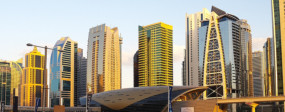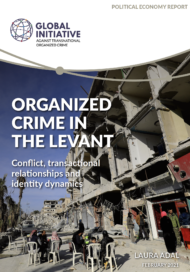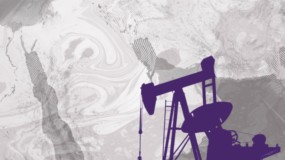Posted on 10 Feb 2023
As global oil prices soar, smugglers are exploiting the lucrative profit margin between Iraq’s subsidized fuel and black-market rates elsewhere. Smugglers move the country’s oil to and through the contested Kurdish region, exacerbating nationwide shortages and depriving the state of much-needed income. These illicit oil flows are also funding Iranian-backed militias, creating broader geopolitical implications for the region.
Iraq, the world’s fifth-largest oil producer, has been struggling with shortages in fuel supply. Throughout 2022, local media reported long queues at various petrol stations and the closure of numerous others due to a lack of fuel in several cities, including Baghdad and Mosul. As tensions heightened among citizens no longer able to fill up their tanks, the government eventually deployed the army to control the resulting chaos.
While citizens are left empty-handed, an estimated 7 million litres of Iraq’s oil is smuggled across the border daily. Much of the country’s oil drainage traverses to and through Iraq’s semi-autonomous Kurdish region in the north-east, where it is either used locally or trafficked to neighbouring countries.
Although smuggling is not a new phenomenon in Iraq, the scale of the illicit oil market has expanded considerably in recent years. Long-standing price differences with surrounding regions have inadvertently spawned a black market for cheap Iraqi fuel, with a broad spectrum of actors moving oil towards the Kurdish region and reaping large profits. The skyrocketing of oil prices worldwide since Russia’s invasion of Ukraine shows no signs of abating and is only further propelling the illicit market.
Fuel subsidies have been a part of Iraq’s economy for decades, put in place to help alleviate the population’s living costs by artificially lowering prices for oil products, particularly petrol. In 2022, fuel was reportedly sold for 500 dinars (€0.35) per litre in Baghdad, compared to around 1 300 dinars (€0.92) in the nearby region governed by the Kurdistan Regional Government (KRG) – where there are no such subsidies in place. Similarly, high prices have been noted in neighbouring countries. Such regional price differences incentivize smugglers to move Iraq’s oil elsewhere.
Political disputes over control of Iraq’s oil resources are further blurring what is already a murky illicit oil market, with oil wealth long being a point of contention between Baghdad and Erbil. With de facto control of Iraq’s north-eastern region, the KRG operates in a legal grey area when selling its oil abroad. To Iraq’s national authorities, the KRG’s oil dealings undermine the country’s sovereignty and divert much-needed public revenue. These longstanding tensions have reached a new high since February 2022, when the KRG rejected a federal court order to hand over all crude oil extracted from its territories and neighbouring areas to the government in Baghdad.
While Baghdad and Erbil have turned the issue into a political matter, Iraq’s smuggled oil is draining into neighbouring countries with problems of their own, including Lebanon and Syria. Allegations of Kurdish authorities’ secret oil shipments to Israel have led to accusations of normalizing state relations with the region’s most controversial country, heightening long-standing geopolitical tensions. The most loyal customer, however, is Turkey: recent figures estimate that over 400 000 barrels of oil are trafficked daily by the KRG via the Kirkuk–Ceyhan pipeline. While the February 2023 earthquake in southern Turkey and northern Syria temporary halted oil movements through this pipeline, the flow of crude oil – legal and illegal – has now resumed.
Iraq’s oil smuggling has severe implications for its post-war reconstruction, having faced a decade of occupation, displacement and sectarian violence. The Ministry of Oil proclaims that about US$150 billion worth of oil revenues have been lost due to smuggling since the fall of Saddam Hussein’s regime in 2003. Meanwhile, oil wealth finances 90 per cent of Iraq’s total state budget, placing Iraq among the world’s most oil-dependent countries and with the smuggling of oil directly harming the country’s state-building capabilities.
Getting in on the action
Iraq is awash with actors smuggling varying volumes of oil towards the Kurdish region, from traders and fraudulent businesspeople to armed groups and corrupt officials. In the border region with the Kurdish territories, the smuggling of oil and other contraband items has become part of the local border economy, where goods have been transported since long before Western Asia’s borders were drawn. Benefiting from porous borders and close-knit networks based on kinship and tribalism, local Kurdish traders – known as kolbars – have turned trading across Iraq, Iran, Turkey and Syria into a livelihood. Fraudulent petrol stations are also complicit in illegally diverting oil onto the black market. In 2022 alone, the Iraqi authorities shut down 11 petrol stations in a law enforcement crackdown, confiscating over 1 million litres of oil and arresting nearly 120 people.
The lion’s share of Iraq’s lost oil revenues, however, is falling directly into the pockets of Iran-backed militias, operating under the umbrella of the Popular Mobilization Forces (PMF). Although initially created to defeat the Islamic State, the PMF has taken control of at least 72 rich oil fields in Iraq’s northern provinces, including Nineveh and Salah-al-Din. Taking advantage of Iraq’s tumultuous north, the PMF is thought to leverage oil smuggling to secure funding for its operations. Iranian-affiliated militias turning to Iraq’s oil industry is not surprising. Oil has long been the commodity of choice for regional militias to generate income through illicit sales and tax revenues. For example, appropriating oil wealth from Syria and Iraq had been the Islamic State’s primary source of financing until their loss of oil fields and other territories in 2019.
The key underlying, and overlooked, concern of Iraq’s oil smuggling problem may be its geopolitical implications, unfolding in a region long tormented by conflict. Illicit markets in Western Asia tend to be highly embedded in state structures and enmeshed with conflict dynamics, and oil smuggling is no exception.
Wider geopolitical implications
Iraq’s oil wealth drainage is occurring against a backdrop of growing Iranian influence. After taking control of the oil fields previously held by the Islamic State, the PMF formed political alliances and assumed power over segments of the Iraqi economy, with varying alleged ties to the state and high-level politicians. For example, many of the country’s border points are informally controlled by PMF militias, further enabling them to support Iran’s military and economic presence in Iraq.
Iraqi and Western officials alike share fears of Shi’ite militias following the trajectory of groups such as Lebanon’s Hezbollah and Iran’s Revolutionary Guards – evolving from militias into parallel state structures with political and military wings, and wielding substantial influence over national politics. In Iraq, such developments would only further solidify Iranian influence within the government.
Iraq’s oil smuggling troubles are yet another example of a Western Asian country serving as a playing field for proxy regional rivalries between Iran-loyal allies on the one hand, and Western states and their regional allies (such as Saudi Arabia) on the other. While national law enforcement efforts target small-scale smugglers and local traders, internal and external actors with vested interests are profiting from the country’s oil to advance in the geopolitical arena. In the meantime, the Iraqi people are struggling to sustain their livelihoods and support their families.
This analysis is part of the GI-TOC’s series of articles unpacking the role of oil in organized crime in Western Asia. The series explores, from a regional perspective, how oil smuggling is influenced by broader geopolitics, the effects it has on local dynamics throughout illicit supply chains and its wider global impact. Sign up to our Western Asia mailing list.



